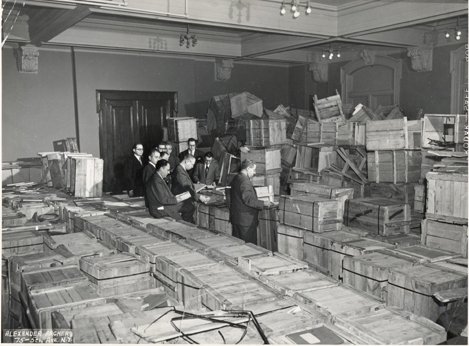
The documents are currently being conserved by three archivists and two librarians in the institute based in the US city, with analogous tasks also underway in the Lithuanian capital, which still has about a third of the archives.
After the seven-year project is completed, the documents that have been scattered during the Holocaust should be brought together once again in a virtual library with descriptions provided in the English and the Lithuanian languages.
“The plan is to process about 1.5 million documents and about 10,000 books, to preserve those that need preservation and to unite these materials with what we have in Vilnius digitally,” YIVO executive director Jonathan Brent told BNS in New York.
“Work has already begun here and, as well as in Vilnius, both on books and on manuscripts. It’s a seven-year project. Everything is very labour-intensive, everything has to be done by hand. All of the careful archival work has got to be done by individuals who are knowledgable in many different languages. They have to know Polish, they have to know Russian, they have to know Yiddish, they have to know Lithuanian,” said the head of the institute.
The YIVO Institute for Jewish Research that operated in Vilnius between 1925 and World War II analyzed Jewish lives across Eastern Europe from Germany to Russia, from the Baltic states to the Balkans. It collected Jewish folk art, memoirs, books and publications, documents of Jewish communities, published dictionaries, brochures and monographs. The majority of documents, many of which date back to 1600s, were written in Yiddish and Hebrew.
After occupying Vilnius and destroying the institute in 1941, Nazis took some of the archival books to Frankfurt. In 1946, the US army discovered the materials and moved them to New York, which had already accommodated the YIVO institute.
After the war, the Soviets also attempted to demolish the remaining part of the Jewish archives in the ruins of the Jewish ghetto in Lithuania as part of the Stalin campaign against Jews. The unique documents were rescued by Lithuanian librarian Antanas Ulpis who hid them in the St. George’s Church in Vilnius. The books and documents saw daylight again after Lithuania regained its independence from the Soviet Union in 1990.
In Lithuania, the project is conducted by Lithuania’s Central State Archive and the Lithuanian National Library of Martynas Mažvydas. Staff of the archive say that in many cases some of the related documents are located in Vilnius, while the rest is in New York.
“When I was in Lithuania, I looked at some material that were still in boxes and were rolled up into balls. When I unfolded them and smoothed them out, literally the dust of the Vilnius ghetto came out of the documents. This is a project that has a quality that is more than just scholarly research project, this is also project of cultural historical reclamation,” said Brent.
The cost of the digitalization project will amount to about 5 million euros, with funding to be generated by the New York institute from private and governmental funds. Lithuanian institutions are also contributing.
During World War II, Nazis and their Lithuanian collaborators killed over 90 percent of Lithuania’s pre-war Jewish population of more than 200,000. About 3,000 Jews currently live in Lithuania.
“There were always people who wanted to save things, they weren’t just killers and they weren’t just victims. There were much more complex historical reality and this project is going to help make that complex historical reality more available to ordinary people to understand on both sides that Jewish were as isolated as they were and Lithuanians were not as stereotypes of World War II depicted them as being. There was real interaction and cultural sharing and also a sense of community that was horribly destroyed by World War II. To be honest, I don’t think either the Lithuanian world or the Polish world or the Jewish world or the Russian world have yet really recovered from that war. I don’t think we have. So this project will attempt helping us recover our collective memory,” Brent added.
Lithuania’s Consul General in New York Julius Pranevičius told BNS that the YIVO archival materials present more than just a picture of the Jewish community’s life in Central and Eastern Europe – it includes unique documents and photographs of architecture, people and customs of Lithuanian cities and towns.
“The YIVO archives should be an interesting source of information to Lithuanians who aim to realize the multicultural history of their state,” said the consul.

Be the first to comment